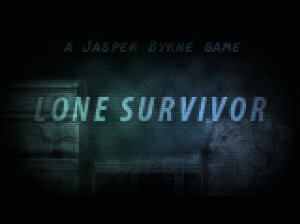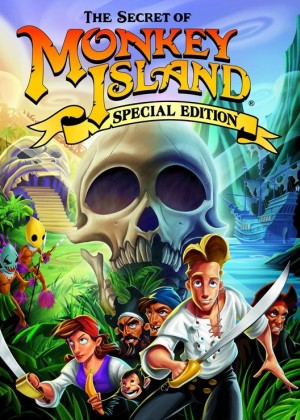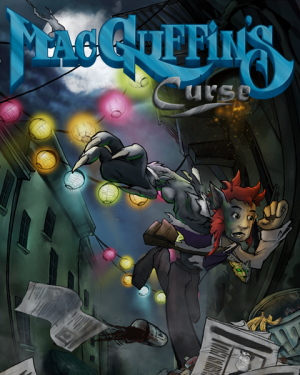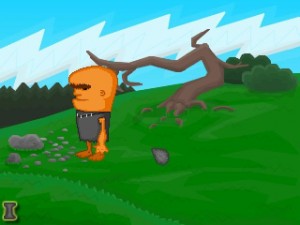High Resolution: A Genre’s New Year interview
So, 2008 is now upon us. As always, starting another calendar year feels like a fresh start, a perfect time to discard the old and usher in the new. But it's a truism that those who fail to learn the lessons of history are doomed to repeat them. So lest today's new becomes nothing more than tomorrow's old, it's probably worth making a few new year's resolutions to bring about positive change over the next twelve months.
The problem with making resolutions is that they're hard to keep, which discourages us from making them in the first place. While it can't guarantee a successful outcome, the key to overcoming the first obstacle of complacency -- and this is very important, so listen closely -- is to make resolutions for others! That's right, it's the best of both worlds! So instead of offering up any personal resolutions, or even some for Adventure Gamers, I've taken it upon myself to come up with a handful (and they will be a handful, I assure you) of resolutions for developers and publishers. These should be printed and tacked onto bulletin boards (or at least dart boards) everywhere that adventures are currently being made, marketed, or even contemplated. This is by no means a comprehensive list, just a few basic issues that leap instantly to mind. So for those making their own lists, by all means expand the number as necessary. This is just a helpful starting point, so feel free to borrow liberally.
Without further ado, then, here are a few key elements that require immediate attention to make 2008 a better year than the last.
I will choose to be original
(For the record, yes, I see the irony in this point being part of something as clichéd as new year's resolutions.)
Notice I'm using the word "original" rather than "innovative". As much as I welcome and encourage innovation, it's by no means necessary to reinvent the wheel each and every time. (Besides, pursuing innovation for its own sake is every bit as contrived and ultimately futile as pursuing convention for its own sake.) For most games, there are going to be more similarities to predecessors than differences. But every game, no matter how traditional its fundamental elements, should have its own unique stamp, a distinctive personality that makes the game memorable and instantly recognizable among all others. If a snowflake can do it, so can you, dammit. Developers, imbue your game with its own soul. There are any number of ways to achieve this, and I'm intentionally leaving the concept vague, as none are inherently superior to others. More importantly, it’s the vision of each development team that should dictate what original elements are featured. If you're introducing "unique elements A, B, and C" because you think THAT is the winning formula, you've already missed the point entirely.
I will embrace my limitations
Far too few developers seem willing to truly embrace their shortcomings. Limitations are seen as obstacles to work around, or to desperately try to overcome, inevitably with disappointing results. So build your limitations into the design plan from the get-go. If lacking in certain talents, then emphasize what you can do and minimize what you can't. If finances are a concern (and when aren't they?), then begin with modest ambitions and master those, rather than overreaching your ability and falling short. There's a big difference between striving for more and striving for better. It's much more important to do a few things well than a lot of things poorly. People will gripe about what's missing, but they'll love it for what's there. And you know what? If people are griping, it's because A) they've played it, and B) they care. Try to gloss over your limitations and you'll accomplish neither.
I will listen to the players
Once again, note the key phrase being "listen to", not necessarily "comply with". Whether you accept or reject any issues raised is entirely up to you, but such decisions should at least be informed ones. No game exists in a vacuum, and all developers want their games to be played, so at some point you need to put your finger on the pulse of the gaming community. You can't have it both ways – if you want to HAVE an audience, you need to at least KNOW your audience, particularly in an interactive medium which by its very nature is about give-and-take between developer and player. So ignore the very people you hope to reach at your peril. Of course, five minutes at any game forum will be enough to discover that there's no such thing as unanimity, but understanding even the subtle differences between gamers can perhaps be as illuminating as finding a consensus. If nothing else, it may just liberate you from the desire to be all things to all people.
I will know when to stop listening to my fans
The previous point can't be taken in isolation, of course. Game design isn't a democratic public process, and ultimately the developer must decide what best suits the vision for the game, even if it will be unpopular with some. And it WILL be, no matter what you do. Too short/too long; too easy/too hard; too linear/too non-linear. These are just some obvious ones, but the list goes on. Regardless of player preference, however, no one can tell you what will work best for YOUR game. Only you know that.
Notice here that I'm saying "fans" instead of "players". For first-time developers, that is a moot distinction. But for experienced developers, there is an additional danger in listening too closely to your fans and not enough to your critics. It hurts more to listen to the criticism, obviously, and there's usually a cesspool of destructive criticism to wade through before finding the constructive. But it's worth the effort if you hope to improve. Unless you dramatically overhaul your next design, your fans will still be fans, so listen to them for an ego boost, then turn your attention to the people who will help you make a better game or reach a wider audience.
I will develop an international marketing and release strategy
The genre's increasing popularity around the world is a good thing, but the international nature of its success brings some challenges as well. Games are being developed in any number of different languages, but there's little rhyme or reason to how and when (and sometimes, unfortunately, "if ") games will be released outside of their native countries. Frankly, it seems like a crapshoot in many cases. Now, it may be a little unrealistic to expect any kind of coordinated international efforts among publishers, but it's not too soon to start thinking and talking about how to increase cooperation. And for developers looking to bring a game to market, it's not enough to simply shrug your shoulders and say it's up to your publisher(s). If signing with a single international publisher, it's vital that you be aggressive in demanding a strategy for bringing the game to multiple markets in a reasonable timeframe and holding them accountable for following through. If seeking localized deals of your own, you'll need a similar plan of your own going in. This wing-and-a-prayer approach just isn't cutting it anymore, largely because of the reason behind the next resolution.
I will come to terms with the fact that the internet has no borders
I've lost track of how many times a publisher has asked me "Are you [Adventure Gamers] American?" The fact is, we're Dutch-owned, I'm Canadian, and less than half of our current staff are American. But the issue isn't that people don't understand how international we are as a staff, it's that they don't understand how international we are as a site, with a wide distribution of readers from all over the world. And that, in turn, demonstrates an underlying ignorance of how global the internet really is (or at least a lack of consideration of the matter altogether). I realize that borders still have a legal and very real meaning to local publishers in terms of their own distribution rights and responsibilities, and I'm not suggesting that everything should be a free-for-all. But I am suggesting that both developers and publishers start understanding the importance of a product's global positioning from the moment it's first announced to the time it's released in every possible territory. There's simply got to be more synergy than the every-publisher-for itself mentality evident all too often in the genre today. What a waste for a game to receive ongoing promotion in one country while being all but ignored in others, only to receive a tiny bit of cursory attention when someone finally decides they'd like to actually sell the game in those other markets as well. So whether in the hands of a developer or international publisher when the game is first announced, remember that the whole world is listening from the moment the news breaks. If you're not prepared to meet the demand of global attention, then you're not prepared, period.
I will explore broader distribution methods
In keeping with the theme of globalization, it's time for everyone in the industry to acknowledge that the age of digital distribution is upon us. It's no coincidence that Adventure Gamers has taken a proactive role in helping bring this about at The Adventure Shop. There is still now and probably always will be a market for boxed products, and by no means am I saying that downloads should be the only means of getting a game. But it is the fastest, the easiest, and ultimately the cheapest (though until it gains a stronger foothold, the consumer is unlikely to benefit from these savings) form of distribution, and it's only increasing in popularity. The adventure genre is notoriously slow at accepting change, and digital distribution seems another area that some publishers are intent on dragging their feet. That has to change. Fear it as a threat, and it will likely be your undoing. Embrace it as an opportunity, and the whole world is instantly at your fingertips. Hmm…. Which would I choose?…
I will localize my game properly
Before leaving the field of international issues, there's still that small matter of getting each localization right. I shudder to think how often a game has needlessly burned itself with shoddy localization, mainly in the areas of translation and voice acting. I'm not underestimating the difficulty of this task, but sinking your all into developing a game and then screwing up the localization is like running a great race and falling flat on your face three inches from the finish line. Not only have you wasted all your effort, but you've suffered the shame and humiliation of the failure to boot. There is absolutely no excuse for poor translation, and while quality voiceovers are much harder to produce, remember that it's voice direction that's most noticeably at fault. Lots of people can act with the right direction, so a word to the wise: if you don't have a fluent foreign speaker already on staff who can handle the job, then find local voice directors you can trust and don't let them go.
I will never rush an unfinished game to market
Yes, I know, this is a revelation, isn't it? But as staggeringly self-evident as it may seem, it's even more staggeringly ignored on all too many an occasion. Again, I don't want to demean the financial constraints of companies in a genre that largely operates on a shoestring. I know all publishers would love the luxury of "when it's done" release dates. But see above for falling just short of the finish line, and add the "only one chance to make a good first impression" reality to that. Yes, patches are commonplace (though less so in adventures than most genres), but buggy games are the single surest way to garner negative reviews and bad word of mouth. You just can't pawn a broken or incomplete product on people and expect them to buy it. If they do buy it, they won't like it, and they'll say they don't like it. Loudly. So bite the bullet if you must, but don't release early with a game that isn't ready. You may feel the pressure of funds running low, but it's a compromise that you'll pay for even more dearly in the end.
I will ever and always playtest, playtest, playtest!
Last and perhaps least considered is the issue of playtesting. I'm not talking about beta testing, as I'm sure every game gets at least a cursory amount of debug time. I'm not so sure that most developers bother with playtesting at all. For those who don't, this is a huge oversight that must be addressed. Without adequate (or any) playtesting from a non-partisan focus group of some kind, how does a developer know if the game works? Functions, yes. Works, no. Like player preferences in general, playtesting will result in a variety of input that will still require developer discretion, but at the very least it will identify key weaknesses that prevent a game from realizing its own potential. Bear in mind that playtesting happens whether you plan it or not. The only difference is, the valuable kind happens in time to benefit the game. The other kind gets written up in the game's post mortem under the heading "if only".
Easier said than done? Absolutely. Aren't all resolutions that are worth pursuing?
This article orginally appeared in Adventure Gamers' now-defunct blog.












